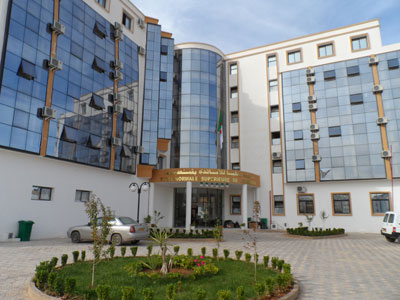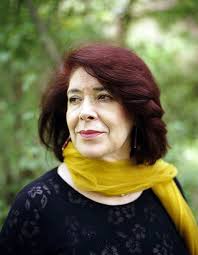Assia Djebar
Assia Djebar, pen name of Fatima-Zohra Imalayene, born on June 30, 1936 in Ouled Hamou (department of Algiers) near Ain Bessem in the current wilaya of Bouira (Algeria) and died on February 6, 2015 in Paris, is a French-speaking Algerian writer.
Author of numerous novels, short stories, poems and essays, she also wrote for the theater and directed several films. Assia Djebar is considered one of the most famous and influential authors in the Maghreb. She was elected to the Académie Française in 2005, becoming the first North African author to be received there.
Assia Djebar was born into a family of the traditional Algerian petty bourgeoisie. Her father, Tahar Imalhayène, from Gouraya, was a teacher who graduated from the Teacher Education Institution of Bouzaréa (Ecole Normal D’instituteurs). Her mother, Bahia Sahraoui, was member of the Berkani family (from the Chenoui Ait Menasser Berber populations of Dahra), whose ancestors fought alongside The Emir Abd El-Kader and followed him into exile. Assia Djebar spent her childhood in Mouzaïaville (Mitidja), studied at the French school and then in a private Coranic school. At the age of 10, she went a middle school in Blida. Unable to learn classical Arabic there, she began to learn ancient Greek, Latin and English. She obtained the baccalaureate in 1953 then entered hypokhâgne at the Bugeaud College of Algiers (now Lycée Emir Abdelkader).
In 1954, she entered the Khâgne at Lycée Fénelon (Paris), where one of her teachers was Dina Dreyfus. The following year, she joined the École Normale Supérieure de Jeunes Filles de Sèvres, where she chose to study history. She was the first Algerian woman to join that School. In 1956, she decided to follow the strike that the General Union of Algerian Muslim Students (UGEMA) called for and refused to sit for exams, and consequently, was expelled from the de Sèvres School. It was on this occasion that she wrote her first novel, La Soif. In order not to shock her family, she adopted a pen name, Assia Djebar: Assia, meaning consolation, and Djebar, meaning intransigence. She married the writer Walid Garn, penname of the playwright Ahmed Ould-Rouis, then left France for North Africa.
Because of her "literary talent", General de Gaulle himself requested her reinstatement in the School in 1959. Since that year, she had studied and taught modern and contemporary history of the Maghreb at the Faculty of Letters in Rabat. At the same time, helped by the specialist of Islamic studies, Louis Massignon, she set up a dissertation project on Lalla Manoubia, a holy matron from Tunis. On July 1, 1962, she returned to Algeria. She was appointed professor at the University of Algiers, where she was the only teacher there to teach modern and contemporary history of Algeria. In this period of post-colonial transition, the question of the language of instruction was raised. Education in classical Arabic was imposed, which she refuses and therefore left Algeria.
In 1965, she decided to adopt, with Walid Garn, the orphan Mohamed Garn.
From 1966 to 1975, she resided most often in France, and stayed regularly in Algeria. She married Malek Alloula for a second time, from whom she later separated.
For ten years, she had abandoned writing and had turned to another form of artistic expression, cinema. She directed two films, La Nouba des Femmes du Mont Chenoua in 1978, a feature movie which won her the International Critics 'Prize at the Venice Biennale in 1979 and a short movie La Zerda ou les chants de l' oblivion in 1982.
From 1997 to 2001, she directed the Center for Francophone and French Studies, founded by Édouard Glissant, at Louisiana State University.
In 1999, she defended a dissertation at the University Paul-Valéry Montpellier, about her own work. The same year, she was elected member of the Royal Academy of French Language and Literature in Belgium.
Living between France and the United States, she taught from 2001 in the Department of French Studies at New York University
On June 16, 2005, she was elected to chair 5 of the French Academy, succeeding Georges Vedel, and was received there on June 22, 2006. She received an honorary doctorate from the University of Vienna (Austria), the University of Concordia in Montreal (Canada) and the University of Osnabrück (Germany).
She died on February 6, 2015 in Paris.



